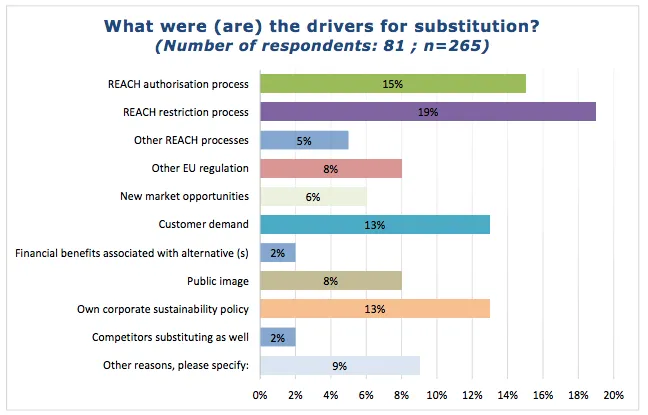Authorisations and restrictions: how legislation promotes substituting harmful substances

Authorisation and restriction as drivers for the substitution of substances
Of the companies surveyed for this study published in July 2020 by ECHA, only 11% of the companies interviewed indicated that they had never substituted the use of a harmful substance with an alternative substance or technology and had no intention of doing so in the future. This means that a very large proportion has already done so or is considering doing so, which shows that in Europe the willingness of companies to reduce their use of harmful chemicals is increasing everyday.
In addition, part of the study focuses on the levers that have prompted companies to substitute or consider substituting the use of a harmful substance. The main drivers are regulatory drivers: 19% and 15% of respondents respectively count REACH restriction and authorisation among the drivers of their substitution.
While regulatory levers play a major role, consumer demand, as well as corporate image and company-specific sustainability policies should not be forgotten as factors playing a major role in the replacement of harmful substances.

Source: ECHA study on the impacts of REACH restriction and authorisation on substitution in the EU.
ECHA reports: background to the study on the role of EU regulations
With a view to supporting and encouraging substitution processes in Europe, ECHA (European Chemicals Agency) has been looking at the levers that encourage companies to substitute their harmful substances with alternative, "greener" substances or technologies.
Through two reports, the Agency presents both the results of a survey on the impacts of REACH restriction and authorisation on substitution in Europe, as well as a report on the implementation of ECHA's substitution strategy over the last two years and the outlook for 2020-2021.
Authorisation and restriction as drivers for the substitution of substances
Of the companies surveyed for this study published in July 2020 by ECHA, only 11% of the companies interviewed indicated that they had never substituted the use of a harmful substance with an alternative substance or technology and had no intention of doing so in the future. This means that a very large proportion has already done so or is considering doing so, which shows that in Europe the willingness of companies to reduce their use of harmful chemicals is increasing everyday.
In addition, part of the study focuses on the levers that have prompted companies to substitute or consider substituting the use of a harmful substance. The main drivers are regulatory drivers: 19% and 15% of respondents respectively count REACH restriction and authorisation among the drivers of their substitution.
While regulatory levers play a major role, consumer demand, as well as corporate image and company-specific sustainability policies should not be forgotten as factors playing a major role in the replacement of harmful substances.

Source: ECHA study on the impacts of REACH restriction and authorisation on substitution in the EU.
ECHA reports: background to the study on the role of EU regulations
With a view to supporting and encouraging substitution processes in Europe, ECHA (European Chemicals Agency) has been looking at the levers that encourage companies to substitute their harmful substances with alternative, "greener" substances or technologies.
Through two reports, the Agency presents both the results of a survey on the impacts of REACH restriction and authorisation on substitution in Europe, as well as a report on the implementation of ECHA's substitution strategy over the last two years and the outlook for 2020-2021.







